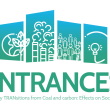ENTRANCES
ENergy TRANsitions from Coal and carbon: Effects on Societies
The H2020 ENTRANCES project addresses the Challenges facing coal and carbon intensive regions, meaning regions that rely on carbon extraction or fossil fuels for their regional economies. It addresses these Challenges within a multi-contextual framework focusing on de-carbonisation policies, de-territorialisation processes caused by this transition and the territorial dimension of clean energy transition.
The decarbonization of coal and carbon intensive regions is often viewed as a “cul-de-sac” of the European energy transition process, where conflicts emerge locally and move to the national and European level and vice versa. Therefore, ENTRANCES analyses these conflicts and the related negotiation processes as well as the political cultures and discourses behind these conflicts. Challenges facing coal and carbon-intensive regions are studied at the territorial level and factors of de-territorialisation are identified and explained in different regions.
The project understands the clean energy transition as a socio-economic-psychological process affecting the life of local communities, not merely as technological change. This means studying local coping strategies in a multidisciplinary framework combining Socio-Economic, Socio-Technical, Socio-Ecological, Socio-Cultural, Socio-Political and Socio-Psychological perspectives. These analytical dimensions are combined and applied to comparative case studies of coal and carbon-intensive regions in Austria, Germany, Italy, Norway, Poland, Romania, Slovakia, Spain, and the United Kingdom.
ZSI is leading the methodological Work Package of ENTRANCES and oversees the process of developing a coherent methodological framework. The framework will integrate the six mentioned dimensions as well as gender aspects and ensure a comparability in the data collection and analysis processes. It contributes also importantly to developing recommendations on the transition process to clean energy in the 13 regions under investigation in the project. A foresight and co-creation approach involving local stakeholders in workshops is used to this end.
Mitarbeiter/innen:
- Dr. Martina Lang, MA
- Mag. Manfred Spiesberger (Projektleitung)
- Markus Otter, MSc
- DI Stefan Philipp
Bereich: Forschungspolitik & Entwicklung
Partner:
- Universidad de A Coruna (Coordinator)
- Alexandru Ioan Cuza University of Iași
- Center of Social and Psychological Sciences/Institute for Forecasting
- EURADA Association Europeenne des Agences de Developpement
- Halle Institute for Economic Research Halle
- Instytut Gospodarki Surowcami Mineralny mii Energią PAN
- Italian National Agency for New Technologies, Energy and Sustainable Economic Development
- Knowledge and Innovation SrlS
- Leibniz Institute of Ecological Urban and Regional Development
- Norges Teknisk-Naturvitenskapelige Universitet
- Sociedade Portuguesa de Inovacao - Consultadoria Empresarial e Fomento da Inovacao S.A.
- Women Engage for a Common Future France
- Cardiff University
Verwandte Artikel:
- News: ENTRANCES Project successfully launched with virtual Kick-off Meeting
- News: ENTRANCES project participates in Horizon 2020 Project Clustering Workshop
- News: First newsletter of the ENTRANCES project on coal & carbon transition published!
- Projekt: Responsible research and Innovation Policy Experimentations for Energy Transition
Tags: clean energy, climate change, co-creation, energy, environment, foresight, regional development
Typ: Forschung
Programm: H2020
Projekt Status: Abgeschlossen
Einreichdatum: 08/2019
Laufzeit: 36 Monate
Von/Bis: 05/2020 - 04/2023
Webseite: https://entrancesproject.eu/



















































